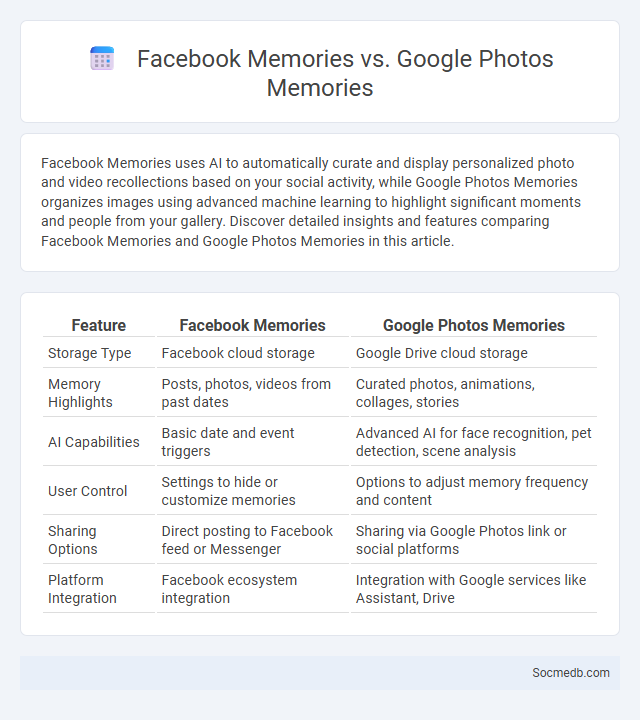
Photo illustration: Facebook Memories vs Google Photos Memories
Facebook Memories uses AI to automatically curate and display personalized photo and video recollections based on your social activity, while Google Photos Memories organizes images using advanced machine learning to highlight significant moments and people from your gallery. Discover detailed insights and features comparing Facebook Memories and Google Photos Memories in this article.
Table of Comparison
| Feature | Facebook Memories | Google Photos Memories |
|---|---|---|
| Storage Type | Facebook cloud storage | Google Drive cloud storage |
| Memory Highlights | Posts, photos, videos from past dates | Curated photos, animations, collages, stories |
| AI Capabilities | Basic date and event triggers | Advanced AI for face recognition, pet detection, scene analysis |
| User Control | Settings to hide or customize memories | Options to adjust memory frequency and content |
| Sharing Options | Direct posting to Facebook feed or Messenger | Sharing via Google Photos link or social platforms |
| Platform Integration | Facebook ecosystem integration | Integration with Google services like Assistant, Drive |
Introduction to Digital Memories
Digital memories capture and preserve personal and collective experiences through photos, videos, and posts shared on social media platforms like Facebook, Instagram, and Twitter. These platforms function as dynamic archives, enabling users to document life events and emotions in real time, creating a searchable and easily accessible history. The integration of AI-driven tagging and facial recognition further enhances the organization and retrieval of digital memories, making social media an essential tool for memory preservation in the digital age.
Overview of Facebook Memories
Facebook Memories provide a personalized collection of your past posts, photos, and life events, enabling you to relive moments shared with friends and family. This feature uses algorithms to surface significant dates, anniversaries, and previously uploaded content, enhancing user engagement. By revisiting these curated memories, you strengthen your connection with your social network and reflect on your digital history.
Exploring Google Photos Memories
Exploring Google Photos Memories allows you to effortlessly relive your most cherished moments through AI-curated albums and nostalgic highlights. The feature automatically organizes your photos by date, location, and people, making it easy to revisit and share significant experiences. Your personalized memories create a dynamic social media story, enhancing how you connect and engage with friends and family online.
Understanding Human Memory
Understanding human memory is crucial for optimizing social media strategies, as it reveals how users encode, store, and retrieve information. By leveraging patterns of attention and recall, your content can be designed to enhance retention and engagement, ensuring messages resonate long after scrolling stops. Insights into episodic and semantic memory help tailor posts that connect emotionally and cognitively with your audience.
Key Features: Facebook Memories vs Google Photos Memories
Facebook Memories automatically curates personalized collections of past posts, photos, and life events based on the user's activity timeline, offering reminders with contextual captions and friend interactions. Google Photos Memories organizes photos and videos using advanced AI to highlight significant moments, locations, and faces, enabling customizable slideshows and nostalgia-driven rediscovery with adjustable time frames. Both platforms emphasize AI-driven personalization but differ in presentation style: Facebook Memories centers on social engagement and shared experiences, while Google Photos focuses on photo organization and visual storytelling.
User Experience Comparison
Social media platforms vary significantly in user experience, with Instagram prioritizing visual content and sleek interface, while Facebook offers robust community features and extensive customization options. Twitter excels in real-time news and concise updates, enhancing your ability to stay informed and engage quickly. TikTok's algorithm-driven feed provides a highly personalized and immersive entertainment experience, optimizing user engagement through short-form videos.
Privacy and Data Security Concerns
Social media platforms collect vast amounts of personal data, raising significant privacy and data security concerns for users. Your sensitive information can be vulnerable to unauthorized access, data breaches, and misuse by third parties, emphasizing the importance of understanding privacy settings and data-sharing policies. Enhancing your knowledge of encryption protocols and regularly updating passwords helps safeguard your online identity against cyber threats.
Impact on Personal Memory and Reminiscence
Social media platforms significantly influence personal memory and reminiscence by creating digital archives that store life events, photos, and interactions for easy retrieval. Your ability to revisit past moments through posts and shared memories enhances emotional connection and self-reflection, fostering a continuous narrative of your life journey. Overreliance on social media for memory storage can, however, affect natural cognitive recall processes and alter how memories are encoded and retained.
Pros and Cons of Digital Memory Platforms
Digital memory platforms on social media offer users easy access to stored photos, videos, and posts, enhancing nostalgia and personal history preservation. They raise concerns about privacy risks, data security, and potential emotional distress from resurfaced content. These platforms also enable social connection and shared memories but may contribute to digital overload and fragmented real-life experiences.
Conclusion: Choosing the Right Way to Remember
Selecting the right method to remember social media content depends on individual learning styles and the platform's features, such as bookmarks, saved posts, or shared collections. Tools like Instagram's Saved Collections or Twitter's Bookmarks enhance organization and retrieval of valuable information. Integrating these options with personal note-taking apps can optimize memory retention and ensure efficient access to important social media insights.
 socmedb.com
socmedb.com